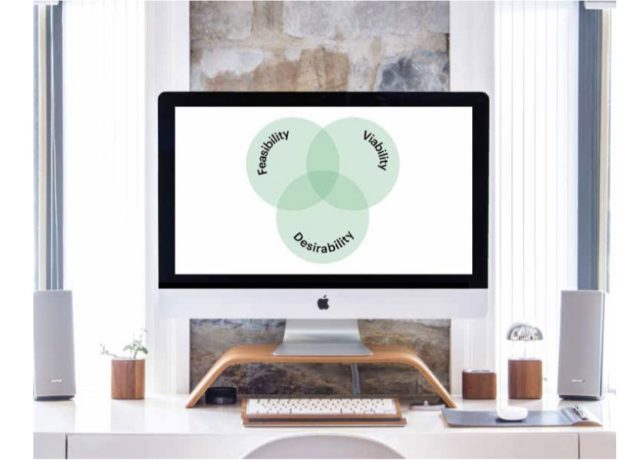Capitalism faces midlife crisis

Capitalism is facing a midlife crisis. Society‘s perception of money is changing (as people become “walking barcodes”). Designing artificial intelligence (AI) is becoming increasingly more complex. Oh, and are you ready to meet your digital twin?
These are some of the latest phenomenons involving the future of business, technology and design, according Fjord Trends 2020, a report by Fjord, the design and innovation unit of Accenture Interactive, Accenture’s agency which helps the world’s leading brands transform their customer experiences across the entire customer journey through connected offerings in design, marketing, content and commerce.
The report draws upon the collective thinking of Fjord’s over 1,200 designers and developers in 33 studios around the world. The annual crowdsourced report is based on first-hand observations, evidenced-based research, and client work.
The first trend, Many Faces of Growth, discusses how companies now measure their growth—not just financially, but also in terms of, say, environmental and social impact.
“Unsettled by changing societal values, climate change and depleting natural resources, and economic and political instability, people are starting to question long-held beliefs—including the notion that growth at any cost is acceptable,” the report reads. “As a result, capitalism is having a midlife crisis.”
JP Palpallatoc, digital lead for Accenture in the Philippines, says this trend also underscores the importance of corporate social responsibility or corporate citizenship. He makes an example of how Accenture Philippines has been focusing its efforts on building the next generation of Filipino talent through digital upskilling initiatives, and through collaboration with industry, the academe, and other organizations. The Skills to Succeed Academy, for one, provides a free online training platform for Filipinos age 16 to 24, which equips them with soft skills and boosts their confidence in order to improve their employability.
The report also makes these three recommendations:
•Think about how you will define new types of value, which you can deliver while making the profit required to thrive.
•Ask your employees what sort of growth they’d like to see in the organization.
•Start to embed new metrics (alongside financial growth) to drive behaviors.
The second trend, Money Changers, looks at how the concept of money and ways of paying are evolving. Cashless payments are becoming more popular across the world, and especially in Asia, states the report. It’s a trend that impacts not just financial institutions, but every organization—in any industry—that handles financial transactions.

Asked which trend—among the seven that the report discusses—would be most prevalent among organizations here in the Philippines, Palpallatoc identifies this one.
“According to the Bangko Sentral ng Pilipinas, the country is en route to becoming ‘cash-lite’ by 2023, as nearly a third of financial transactions in the country are already being done through digital channels. With the rise of technology, Filipinos are now more open using digital wallets and doing digital payments through applications like GCash, PayMaya, and Coins.ph, along with the government’s eGov Pay and QR Ph,” he says.The report suggests that organizations assess, first, how the “changing landscape of money” will affect their business and customers. Then comes the all-important factor of trust, and organizations must be able to communicate to their consumers that their digital financial transactions are conducted in a secure environment.
The third trend, Walking Barcodes, talks about facial and body language recognition, and the potential for new products and services surrounding these technologies to be developed. In China, for example, Ant Financial’s AliPay has a “Smile to Pay” feature; one literally just has to smile at a camera for his payment to be processed and deducted from his mobile wallet.
To keep up with this trend, the report recommends that companies reimagine new services, especially now that 5G is becoming increasingly available. Aside from facial and body language recognition, consider which services can use biometrics, too. These are all subject to data privacy laws, so establish, again, a relationship founded on trust with consumers by educating them on data consent.
The next trend, Liquid People, discusses what lies beyond consumerism—the fact that people still want to buy, but are starting to refrain from using material things to define themselves. The trends also look at how people are changing their views about work, particularly, about what lies “beyond the notion of work simply as a means to make a living.” Companies, therefore, need to “reimagine [their] offering for the era of conscious consumerism,” the report says.
Trend No. 5, Designing Intelligence, is the next iteration of artificial intelligence, the report says, and will be about adding new value and supporting human ingenuity. According to Palpallatoc, this is one trend to watch out for here in the Philippines, as more companies use AI for their processes.
“The report also poses this challenge: How can organizations make AI part of their strategic decision-making process, rather than just a feature that automates individual tasks?
The sixth trend is Digital Doubles, referring to digital twin technology, which creates a virtual model of a process, product or service. It’s not new—think virtual prototypes, to test the viability of products—but given the vast amount of data we share online, the potential of such technology for personalization of services is huge, since your digital double would, ideally, know your preferences, based on an aggregation of your data.
For companies, the report says that this is the critical question: How can we design trust and safety in [a customer’s digital double] to give people the confidence to choose us as their host?
Lastly, Life-centered Design, says the report is a trend that’s a response to the first one, Many Faces of Growth. Inspired by writer John Thackara’s theory of “designing for all life” and not just humans’, this trend is about people shifting from a “me” to “we” mind-set. It’s about designing for the planet. “I think whose two go hand-in-hand when we speak from the corporate perspective. We have seen how companies are striving to champion initiatives in inclusion and diversity, which is a big trend both globally and in the Philippines,” Palpallatoc says.
Ultimately, 2020 will be all about companies starting to move in a direction that contributes to more meaningful, mindful and forward-thinking business, adds Brian Whipple, Accenture Interactive CEO.
“The decade ahead will see a challenging of fundamentals,” he says. INQ
